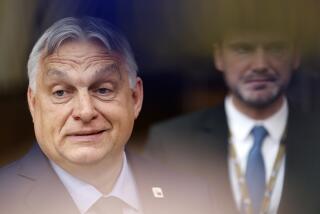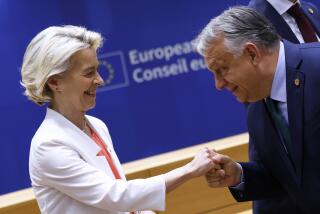Hungary: Ruffles and Flourishes
- Share via
Janos Kadar devoted a good number of his 32 years in power to making Hungary a laboratory for economic experimentation unique within the Soviet Bloc. His “market socialism,” with its easing away from ideological rigidities, drew the interest of reformers in China and the nervous attention of other Eastern European hierarchs. Hungarians came to speak of themselves as socialists in the morning, capitalists in the afternoon. But Hungarians who have had the chance under Kadar’s long tenure to taste something of the better life still are a long way from achieving the good life. An economy that once seemed robust has stagnated, foreign debt has soared, political restiveness has grown. The blame has increasingly fallen on the 76-year-old man at the top. This week, in a quiet political coup, Kadar was put out to pasture.
His successor as head of the Communist Party is Karoly Grosz, named prime minister by Kadar just a year ago. Observers describe Grosz as a hard-nosed reformer. Add to that an apparent affinity for candor. In an interview two days after his election Grosz acknowledged his government’s failure so far to revitalize Hungary’s economy, and warned that his planned reforms won’t bring improvements overnight. Those new approaches amount to a considerable agenda for change. They include encouraging more foreign investment and joint ventures, relaxing restrictions on the ownership of foreign capital, expanding private initiatives and giving Hungarians a greater voice in their political and economic affairs.
Kadar came to power in the wake of the 1956 rebellion that explosively showed how deep Hungarian hatred for Soviet domination and Communist rule was. Grosz comes to power at a time when economic and social restructuring and maybe even a dose of political liberalization are official if still not final doctrine in the Soviet Union. Leaders in other Warsaw Pact countries--in East Germany and Czechoslovakia particularly--look on Mikhail S. Gorbachev’s reformist instincts with fear and loathing. Grosz gives every sign not only of supporting Gorbachev’s reforms but also of being ready to introduce more progressive flourishes of his own.
More to Read
Sign up for Essential California
The most important California stories and recommendations in your inbox every morning.
You may occasionally receive promotional content from the Los Angeles Times.













